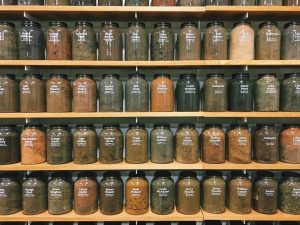by David Swanson, Pastor, New Community Covenant Church
Last weekend I participated in a Sankofa Journey, a three-day cross-racial bus ride through southern Civil Rights sites. Jon White and I did this same trip together six years ago and the experience was as powerful for me this time as it was then. The journey includes stops in Birmingham, Montgomery, Selma, Jackson, and Memphis and at each one we learned more about the brave women, men, and children who chose to sacrifice so much in the pursuit of freedom.
In Montgomery we visited Equal Justice Initiative, founded by Bryan Stevenson whose book, Just Mercy, I can’t recommend to you enough. EJI is committed to gaining freedom for wrongfully convicted prisoners in Alabama. In more recent years they have begun to document the thousands of “racial terror lynchings” that were enacted on Black bodies and communities in the years following the Civil War. As part of this project, volunteers gather soil from the site of a lynching which is then placed in a jar with the victims name printed on it. As we walked into a large room at EJI one room was dominated with hundreds of these soil-filled jars and names. It was incredibly sobering to realize that these jars represented only the state of Alabama.
As I think about my two Sankofa trips one common theme is how our country tells a sanitized version of its history. Participants in these trips, regardless of race or ethnicity, consistently remark about the amount of new information they gain during our site visits, information that tells a more truthful story about ourselves. Lynching isn’t something most of us were taught to consider when thinking about this nation’s history and without these devastating stories we easily miss important threads of injustice and oppression that run from slavery through convict leasing, voter suppression, federally-mandated segregation, mass-incarceration, and so on. When we don’t see these sinful threads we end up treating injustice as a series of isolated events rather than a struggle against more comprehensive systems of oppression, a struggle that the Apostle Paul said was “against the rulers, against the authorities, against the powers of this dark world and against the spiritual forces of evil in the heavenly realms.” (Ephesians 6:12)
Forgetting our complicated and, often, wicked history has real implications. For example, those who benefit from this nation’s racial hierarchy are tempted to downplay the injustices that are inflicted on communities of color, thinking about them as coincidental events rather than a destructive chain of interlocking events. On the other hand, those who’ve been systematically disenfranchised can internalize the trauma of racial terror when it is experienced in isolation. But when we tell the truth we are opening space for genuine repentance and celebration- repentance for my complicity in an oppressive system and celebration for God’s faithfulness among so many resilient people and communities who have survived and thrived despite this nation’s often malicious intentions.
The God we worship cares about history and the uniqueness of our stories. God names places and festivals and people as a way to prick our memories and imaginations; we remember what God did in the midst of awful circumstances and we look into the future with conviction about his trustworthiness. We forget at our own peril. When we remember we open our hearts to increased faith, to more opportunities for forgiveness and healing. As a multi-racial/ethnic church we don’t have the luxury of not telling the truth about our history; anything less will inhibit the unity that bears witness to the Gospel.
Sankofa is a word that originates in Ghana and means “go back and get it,” referring to the importance of knowing our history as we make our way into the future. May we continue to be a church community which is unafraid of our histories, even as we look into God’s hopeful future where all of history is swept into God’s righteous redemption.
The next Sankofa trip is October 26-29. You can learn more on the ECC website.


